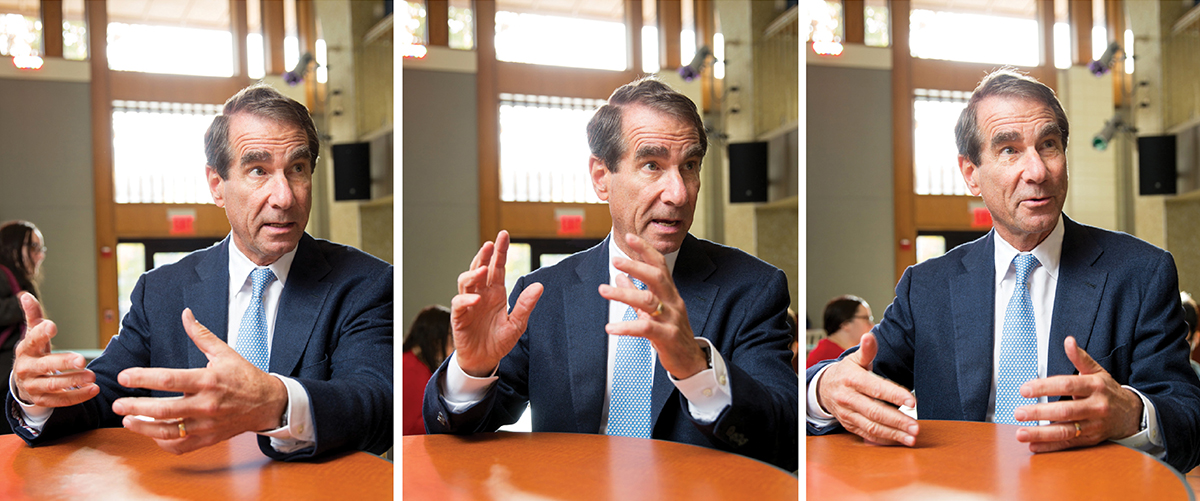Power Lunch: Alan Solomont

Photographs by Ken Richardson
Photos of Alan Solomont with Hillary Clinton, President Obama, the former King Juan Carlos I of Spain, and his son, King Felipe VI, line the walls of Solomont’s Tufts University office. The images serve as a testament to his indefatigable interest in politics: Prior to his deanship at Tufts’ nonpartisan Jonathan M. Tisch College of Citizenship and Public Service, Solomont, 66, spent two decades as a major fundraiser for Democratic presidential candidates, which led to his 2009 appointment as Obama’s ambassador to Spain. As someone keenly interested in national and international politics, Solomont got lunch with Erick Trickey at Tufts’ Mayer Campus Center to discuss current events, the new election cycle, and how fundraising will affect the 2016 presidential race.
Which candidate are you supporting?
I’ve contributed to Senator Clinton. I think the world of her. She’s an extremely talented woman. She has incredible preparation for this job. My wife adores her. I think because she’s a woman, because we have two daughters, because her mother was a political activist, the idea of electing the first woman speaks to her in a unique way. We tend to operate as a team, but she would’ve been with Hillary in ’08 if she had made the decision without me. Now I’m following her lead.
How did supporting Obama in ’08 affect your relationship with the Clintons?
I served under Hillary Clinton for almost four years [in the State Department]. I like to believe that we still have a warm connection.
How did you become an ambassador? Did you apply for the job and ask for a certain country?
They said, “Would you like to go to an embassy?” About a third of our ambassadors are noncareer appointees. Some people call them political—I like to call them noncareer. I believe that we bring some life experiences, some other skills. There was no reason to send me to Spain. I was just incredibly lucky. [In Spanish] When I went to Spain, I didn’t speak a word of Spanish. I studied a lot, and hard, but unfortunately, my Spanish is still very rusty.
When the right replaced the left in power in Spain, what kinds of challenges did you face?
Fortunately, I was well prepared. My predecessor gave me some great advice: Get as close to the opposition as you are to the government.
How will Citizens United affect fundraising in this election?
Writing million-dollar checks has changed the business enormously. Our politics have been hijacked by big- money interests—and that’s coming from a big-money guy. The Democrats are at a disadvantage. There is a certain amount of online money available—that’s what’s fueling Bernie Sanders.
Why are you in favor of the Iran nuclear deal?
After spending two years getting the Iranians to the table and making a deal, if we had walked away from it, our diplomatic credibility would’ve been destroyed, at least for the rest of this presidency. There was no realistic alternative to preventing Iran from becoming a nuclear-armed state. If this deal didn’t happen and Iran continued their nuclear program, there’s only one thing we could have done: some type of military action. I think the Israeli position was that the United States has such enormous economic influence that if we insisted on continuing the sanctions, we could have enforced that with other countries. That’s bullshit.
You’re involved in the progressive Jewish activist group J Street. What has it accomplished?
It gives voice to those folks in the American Jewish community who believe that Israel’s security depends on a two-state solution [to the Israeli-Palestinian conflict]. To be honest with you, when it was founded, it was hard to get members of Congress to accept its endorsement. Now we have members beating down the door.
Tell me about Tufts’ bridge-year program.
We launched the program this fall as a way to rethink how we prepare students for college. We sent 15 students to Brazil, Nicaragua, and Spain, where they’ll spend a year doing full-time community service prior to their formal academic studies. By going off to a new place, they’ll learn about the world and about themselves and solve real problems.


